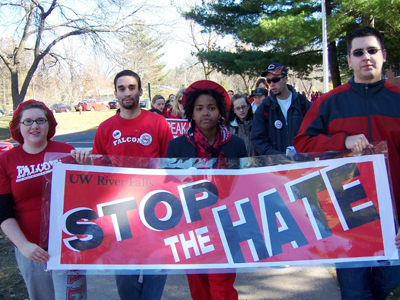Obama’s re-election: not the end of racial inequality in US

Americans fighting for racial discrimination
In November of 2008, Barack Obama won the presidential election and became the first African-American president in American history. For the U.S, this was definitely a historic moment because the countries’ severe struggles against racial discrimination over many generations. Having been re-elected as president this past November, Barack Obama, will be inaugurated on January 21st, 2013. Coincidently, his inauguration will occur on Martin Luther King Day. Is Obama’s presidency the realization of the civil rights activist’ dream?
Blacks and whites exceed other races at voting booths
On December 26th, 2012, Pew Research Center released updated survey statistics on voter demographics which indicated that Caucasians, constituting 72% of voter turn-out for the most recent election, and African-Americans, constituting 13% of voter turn-out, surpassed other ethnicities (Hispanics accounted for 10%, while Asians only 3%). According to the data released by the U.S. Department of Labor on January 4th, 2013, the unemployment rate among African-Americans’ reached to 14% in December 2012—7.8% higher than the national average.
Social status of ethnic minorities in US stagnating
In recent years, though changes in racial distribution of the U.S. population structure have affected American politics and public policy at an increasingly profound level, the status of African-Americans has not truly improved. According to the survey Income, Poverty, and Health Insurance Coverage in the United States: 2011 published by the U.S. Census Bureau in September 2012, 27.6% of African-Americans were living in impoverished conditions, which was 15% higher than the overall poverty rate, and even much higher than other ethnic minorities in U.S.
Besides African-Americans, even Asians’ (who have a relatively higher economic status) social position is below expectation. On average, Asian students significantly outperform their peers, but this does not guarantee that their admittance to America’s elite institutions. In his 2009 critical examination of racial factors in college admittance entitled No Longer Separate, Not Yet Equal, Thomas J. Epenshade, professor of sociology at Princeton University, compiled data on the academic achievements of more than 9,000 enrolled in the top 10 universities during the 1980s and 1990s. His results showed that the Caucasian median SAT scores were only 1310 compared with Asian’s 1450. Though many years have passed since he collected the data, Professor Espenshade maintains that unequal criterion for Asians have not significantly improved.
Racial self-segregation still at large in American social life
One only has to visit American communities, read American newspapers or watch American TV to see that the country promulgates an image of racial harmony. In commercials, women of several ethnicities will speak a particular cosmetics’ praises, or Caucasian and African-American families purchase the same insurance policy. However, statistics paint a different picture: in a study conducted by Brown University and the Urban Institute, the average white American lives in a neighbor. In fact, these commercials do not reflect racial realities in America—most Americans prefer to socialize with people from their same ethnic and socio-economic background. Based on research conducted by Brown University and the Urban Institute, the average white American lives in a neighborhood where more than 77% are also white.
U.S. Census data from 2010 showed that in spite of the increase of ethnic minorities, interracial marriages only constitute 10% of marriages in the U.S., and amongthat 10% many encountered marital problems. According to data collected by the National Center for Health Statistics in U.S. in 2002, the divorce rate of interracial couples who had been married for at least ten years is 41%—10% higher than that of couple of the same race.
Additionally, the children of interracial marriages often encounter problems. Dwight N. Hopkins, a professor of theology at the University of Chicago, asserted that anyone who inherited one drop of African-American blood is defined as blacks. President Obama wasn’t regarded as a Caucasian, despite his mother being white. In fact, since he joined the presidential race in 2008 the public never cased inquiries about his birth certificate and ethnicity to his views vis-à-vis the radical speeches of former pastor Jeremiah Wright. In a speech at Emory University in 2009, former President Jimmy Carter remarked that though he believes racism still exists in America, President Obama should not have been elected simply because of his race.
The Chinese version appeared in Chinese Social Sciences Today, No. 402, Jan. 9, 2013
Translated by Zhang Mengying

 PRINT
PRINT CLOSE
CLOSE